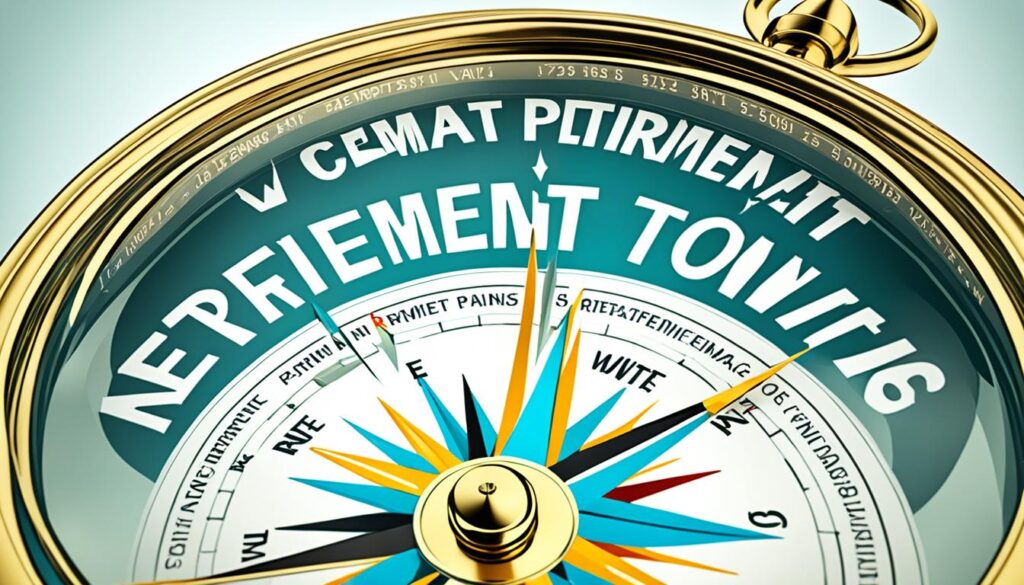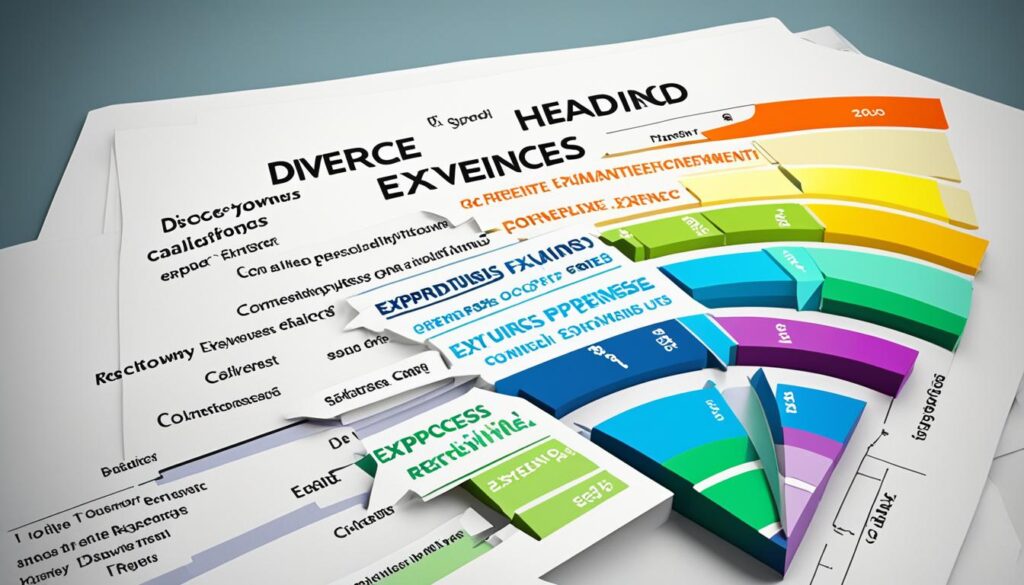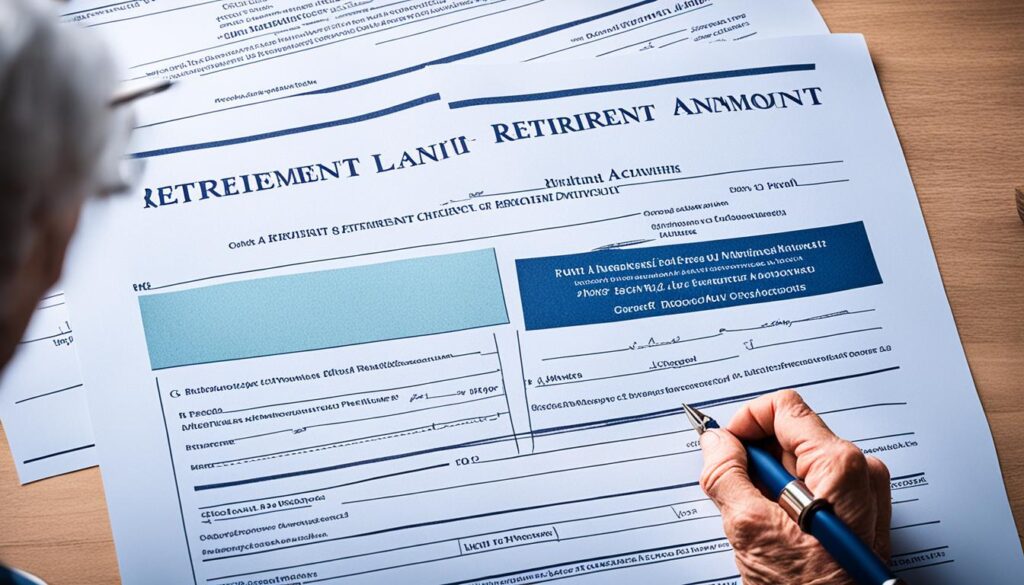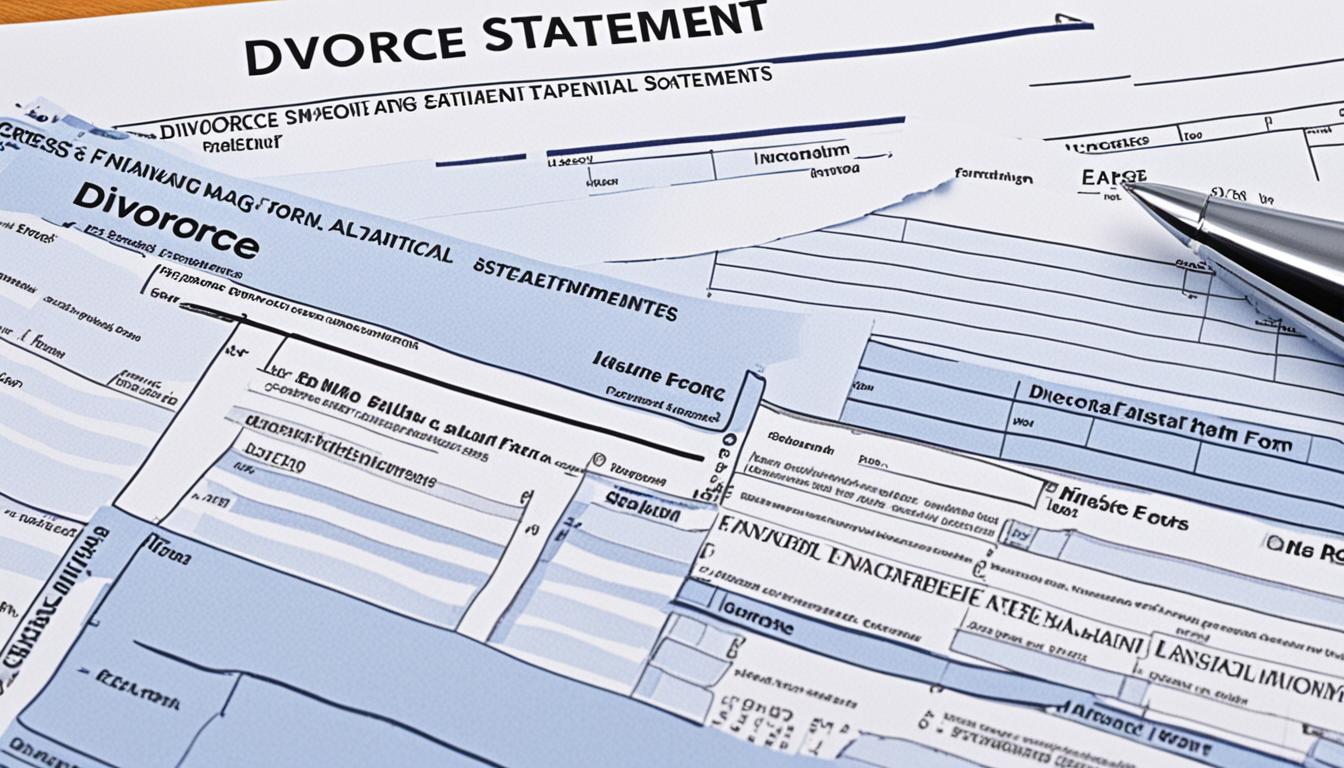Did you know that divorce rates have doubled for Americans over the age of 50 since the 1990s? These grey divorces can have significant financial consequences, particularly when it comes to retirement planning. Rebuilding savings and ensuring a secure financial future is crucial for individuals starting anew after a divorce.
Creating a new retirement plan tailored to post-divorce living is essential. It involves assessing expenses, maximizing contributions, understanding the division of assets, and seeking professional guidance. By navigating these challenges strategically, individuals can regain stability and work towards a secure retirement.
Key Takeaways:
- Divorce rates among Americans over 50 have doubled since the 1990s.
- Rebuilding a nest egg and securing a stable financial future after divorce requires proactive retirement planning.
- Assessing post-divorce expenses is crucial for setting realistic retirement goals.
- Maximizing retirement contributions through 401(k)s and IRAs accelerates rebuilding retirement savings.
- Understanding the division of assets, such as retirement accounts and inheritances, is vital for an equitable outcome.
Strategies for Building Retirement Savings
When it comes to building retirement savings, there are several effective strategies to consider. By taking advantage of key investment vehicles such as a 401(k) and an IRA, individuals can maximize their savings potential and work towards a secure financial future.
Contributing to a 401(k)
Many employers offer a 401(k), a popular retirement savings option. It allows employees to contribute a portion of their pre-tax income to their retirement savings. One significant advantage of a 401(k) is that employers often provide matching contributions, which can be viewed as free money toward retirement.
Individuals can significantly accelerate their retirement savings by participating in a 401(k) plan and taking advantage of employer matching. The contributions made to a 401(k) are tax-deferred, meaning they are not taxed until the funds are withdrawn during retirement.
Opening an IRA
In addition to a 401(k), individuals can further enhance their retirement savings by opening an Individual Retirement Account (IRA). An IRA allows individuals to save for retirement on their own, especially for those who do not have access to an employer-sponsored 401(k) plan or wish to save more than the contribution limits of a 401(k).
Contributions to an IRA are made with after-tax dollars, meaning they are not tax-deductible. However, individuals can benefit from tax-deferred growth, as the earnings on the investments within the IRA grow tax-free until withdrawals are made during retirement.
Catch-Up Contributions
As individuals approach retirement age, taking advantage of catch-up contributions is essential. Catch-up contributions allow individuals aged 50 or older to contribute additional funds to their retirement accounts, such as a 401(k) or an IRA, beyond the regular contribution limits.
For a 401(k), the catch-up contribution limit for individuals aged 50 or older in 2021 is $6,500 in addition to the regular contribution limit of $19,500. Similarly, for an IRA, the catch-up contribution limit for individuals aged 50 or older in 2021 is $1,000 in addition to the regular contribution limit of $6,000.
Consulting a Financial Advisor
Navigating the nuances of retirement savings and developing a comprehensive plan can be overwhelming. That’s why it is beneficial to seek the guidance of a financial advisor with expertise in retirement planning.
A financial advisor with a Certified Financial Planner (CFP) designation can provide personalized advice tailored to individual circumstances. They can help identify the most suitable investment options, recommend optimal asset allocations, and assist in setting achievable retirement goals.
Financial advisors can also offer valuable insights on tax-efficient strategies, estate planning considerations, and risk management techniques to ensure a well-rounded retirement plan.

By implementing these strategies and seeking professional guidance, individuals can build their retirement savings effectively and take the necessary steps towards a financially secure future.
Division of Retirement Assets in Divorce
Divorce can significantly impact retirement assets. The division of these assets can vary depending on the type of state in which the couple resides. In community property states, the general principle is to divide assets acquired during the marriage equally between both parties involved. On the other hand, common law states employ an equitable division approach, where the courts have discretion in determining what is fair.
When it comes to retirement accounts like 401(k)s and IRAs, the division process may require the filing of a qualified domestic relations order (QDRO). A QDRO is a legal document that stipulates how retirement funds should be divided between spouses. It ensures a fair and orderly distribution of these assets while considering the unique circumstances of each case.
Another type of retirement asset that may come into play during divorce proceedings is the defined-benefit pension. These pensions, earned during the marriage, are often considered shared assets and subject to division between former spouses.
While retirement accounts and pensions are typically divided, it’s important to note that specific laws and regulations control Social Security benefits. A divorced spouse may be eligible for ex-spousal benefits, depending on the duration of the marriage, among other factors. Understanding the rules surrounding Social Security benefits can help individuals navigate the financial implications of divorce on their retirement planning.

| State Type | Guiding Principle | Retirement Assets Considered |
|---|---|---|
| Community Property | Equal division of assets acquired during the marriage | 401(k), IRA, defined-benefit pensions |
| Common Law | Equitable division based on court discretion | 401(k), IRA, defined-benefit pensions |
Consulting with legal professionals specializing in divorce and retirement planning can provide individuals with the necessary guidance to navigate the division of retirement assets. They can help ensure a fair and equitable distribution, considering the specific laws and regulations in the relevant jurisdiction.
Handling Inheritance in Divorce
Inherited assets in divorce can be a complex and nuanced matter. Various factors determine how inheritance is handled during asset division. In community property states, separate assets such as inherited money or property are generally retained by the recipient spouse. However, the situation becomes more intricate if the inheritance is commingled with shared funds, as it may be considered marital property subject to division.
Divorce courts strive to achieve equitable outcomes, considering each case’s specific circumstances. Judges have discretion in decision-making and consider a range of relevant factors when dividing assets, including inheritances acquired during the course of the marriage.
To navigate the intricacies of handling inherited assets in divorce, it is advisable to seek guidance from an estate specialist. These professionals possess the expertise to provide valuable advice on the division of inheritances acquired during marriage, ensuring a fair and equitable outcome for both parties.
Understanding the complexities of inheritance and divorce is crucial for individuals going through the separation process. Consulting an estate specialist can provide the necessary clarity and guidance to make informed decisions regarding inherited assets, ultimately safeguarding one’s financial future.

The Role of an Estate Specialist
Consulting an estate specialist can provide invaluable guidance on dividing inherited assets acquired during the course of a marriage. These professionals possess a deep understanding of inheritance laws and can help ensure a fair division of assets during divorce proceedings.
Updating Financial Plans Post-Divorce
After finalizing a divorce, updating your financial plans to reflect your new situation is essential. This includes revisiting your overall financial goals and ensuring that your plan is still on track.
One important aspect of updating your financial plans after divorce is reviewing and updating them. Evaluate your current income, expenses, and assets to make necessary adjustments. Assess your retirement savings and determine if any changes need to be made to account for the divorce settlement. It is also crucial to consider any ongoing financial obligations such as alimony or child support.
Another key consideration is updating your will. Divorce can have significant implications for your estate planning. Review your will and make any necessary updates to reflect your changed circumstances. Decide how you want your assets to be distributed and consider appointing new beneficiaries or executors.
Additionally, it is essential to update the beneficiaries on your financial accounts. Many people overlook this crucial step, but it is important to ensure that your assets go to the intended recipients. Review the beneficiaries on your bank accounts, retirement accounts, life insurance policies, and any other financial assets. Update the beneficiaries to align with your current wishes, taking into account the divorce settlement and any changes in your family dynamics.
“Updating your financial plans after divorce is crucial to ensure that your hard-earned money goes where you want it to go. Don’t forget to review your financial plan, update your will, and update the beneficiaries on your financial accounts.”
Working with a trusted financial advisor can be beneficial during this process. A financial advisor can help you navigate these changes and provide guidance on adjusting your financial plan, updating your will, and ensuring that the beneficiaries on your accounts are up to date. They can offer valuable insights and help you make informed decisions to secure your financial future post-divorce.
| Steps to Update Financial Plans Post-Divorce |
|---|
| Review and update your financial plan |
| Update your will to reflect changed circumstances |
| Review and update the beneficiaries on your financial accounts |
| Consider working with a financial advisor |

By taking the necessary steps to update your financial plans after divorce, you can ensure that your finances align with your new circumstances and goals. Regularly reviewing and adjusting your financial plan, will, and account beneficiaries is essential to maintain control over your financial future and protect the assets you’ve worked hard to build.
Seeking Professional Help
When navigating retirement planning after divorce, it is important to seek professional help to ensure a secure financial future. A financial advisor, particularly one with a Certified Financial Planner (CFP) designation, can provide expert guidance and advice on creating a comprehensive retirement plan tailored to individual needs and goals. They have the knowledge and experience to analyze the current financial situation, assess risks, and recommend suitable investment strategies to help rebuild and grow retirement funds.
An estate specialist is another valuable professional to consider. They can offer advice on dividing inherited assets acquired during the marriage, ensuring a fair and equitable distribution. Estate specialists have a deep understanding of the complex legal and financial aspects involved in estate planning and can help individuals make informed decisions regarding inheritances.
When selecting professionals, it is important to have a good rapport and trust in their expertise. Take the time to interview and evaluate potential financial advisors and estate specialists to find the right fit. The collaboration between individuals and these professionals is crucial in navigating the complexities of retirement planning after divorce and achieving long-term financial security.
“A financial advisor and an estate specialist are valuable resources when navigating retirement planning after divorce. Their expertise and guidance can help individuals create a comprehensive retirement plan and navigate the complexities of dividing assets.”
Certified Financial Planners: Going Beyond Financial Advice
Certified Financial Planners (CFPs) go above and beyond traditional financial advisors, as they have met rigorous education, experience, and ethical requirements. They have a comprehensive understanding of various financial aspects, including retirement planning, tax strategies, investments, and insurance. CFPs can provide personalized advice that takes into account both the short-term and long-term financial goals of individuals.
Working with a CFP can provide peace of mind, knowing that the retirement plan is built on a strong foundation and aligned with the individual’s unique circumstances. They can assist in developing a detailed roadmap that maximizes retirement savings and minimizes unnecessary financial risks.
Dividing Inherited Assets: Guidance from an Estate Specialist
Inherited assets can become a contentious issue during divorce proceedings. An estate specialist can provide valuable guidance on how to navigate this complex scenario. They have a deep understanding of inheritance laws and can help individuals determine whether inherited assets should be considered separate or marital property.
By seeking advice from an estate specialist, individuals can gain clarity on the best course of action for dividing inherited assets acquired during the marriage. This guidance ensures that the division is fair and aligned with legal requirements, preventing potential disputes and ensuring a smoother transition to the next stage of financial independence.
Key Considerations When Seeking Professional Help
| Consideration | Financial Advisor | Certified Financial Planner (CFP) | Estate Specialist |
|---|---|---|---|
| Expertise in retirement planning | ✔ | ✔ | |
| Comprehensive financial advice | ✔ | ✔ | |
| Assessment of individual financial goals | ✔ | ✔ | |
| Estate planning and inheritance expertise | ✔ | ||
| Customized retirement plan | ✔ | ||
| Rapport and trust | ✔ | ✔ | ✔ |
Seeking professional help from a financial advisor, CFP, and estate specialist is crucial when navigating retirement planning after divorce. Their expertise can provide guidance on creating a comprehensive retirement plan, dividing inherited assets, and maximizing financial security.

Secure Your Financial Future
Divorce can have a significant impact on financial security, but it is possible to rebuild wealth and secure a comfortable retirement. By creating a new retirement plan, taking advantage of savings options like 401(k)s and IRAs, and seeking professional guidance, individuals can navigate the financial challenges of divorce and work towards a financially stable future. With careful planning and proactive steps, it is possible to overcome the setbacks of divorce and achieve financial independence in retirement.
Creating a New Retirement Plan
After divorce, it’s important to reassess and create a new retirement plan. This involves evaluating your financial goals, estimating retirement expenses, and determining how much you need to save to maintain your desired lifestyle. Consider factors such as downsizing, travel plans, and any changes in income or expenses. By creating a comprehensive retirement plan tailored to your new circumstances, you can regain control of your financial future.
Utilizing Savings Options
To rebuild wealth and secure your retirement, take advantage of savings options like 401(k)s and IRAs. Contribute as much as possible to your employer-sponsored 401(k), especially if there is a matching contribution. This allows you to maximize your retirement savings and benefit from free money towards your future. Additionally, consider opening an IRA if you don’t have access to a 401(k) or want to save more. IRAs provide additional flexibility and potential tax advantages.

Seeking Professional Guidance
Navigating the financial complexities of divorce and rebuilding wealth can be challenging, which is why seeking professional guidance is crucial. Work with a financial advisor who specializes in retirement planning to develop a personalized strategy that aligns with your goals. A certified financial planner (CFP) can provide expert advice and help you make informed decisions. Additionally, consult with an estate specialist to ensure proper division of assets and navigate any inheritances received during the marriage.
“Seeking professional guidance can provide you with the expertise and knowledge necessary to secure your financial future after divorce.”
Building a Strong Financial Foundation
Rebuilding wealth and securing your retirement requires a strong financial foundation. Be proactive in managing your finances, track your spending, and focus on saving and investing. Implement sound financial habits and consider working with professionals to develop a solid financial plan. Together, these steps will help you regain stability and work towards a comfortable and secure retirement.
In conclusion, while divorce can have a significant impact on financial security, it is possible to rebuild wealth and secure your retirement. By creating a new retirement plan, utilizing savings options, seeking professional guidance, and focusing on building a strong financial foundation, you can overcome the setbacks of divorce and achieve financial independence in your retirement years. Take proactive steps today and secure your financial future.
Importance of Assessing Expenses
Assessing expenses is a crucial step in retirement planning after divorce. It is essential to determine the desired lifestyle and calculate the associated costs to set realistic goals and make informed investment decisions.
One important consideration is downsizing to a smaller and more affordable home. Downsizing not only reduces housing expenses but also frees up funds for other retirement needs. It can be an effective strategy to optimize retirement expenses and maintain financial stability.
Another factor to consider is travel. Divorce often brings a newfound freedom to explore and experience new adventures. However, increased travel expenses should be taken into account when planning for retirement. By estimating travel costs and incorporating them into the retirement plan, individuals can ensure that they have sufficient funds to support their desired travel lifestyle.
By thoroughly understanding and assessing post-retirement expenses, individuals can develop a comprehensive retirement plan that aligns with their lifestyle goals. This includes preparing for both essential expenses and discretionary spending, such as hobbies and entertainment.
Assessing expenses accurately is crucial for creating a retirement plan that provides financial security and peace of mind. By taking the time to evaluate the necessary costs and make informed decisions, individuals can set realistic goals and make the most of their retirement savings.
Retirement Expenses Worksheet
To help individuals assess their retirement expenses, here is a simple worksheet that outlines common categories:
| Expense Category | Monthly Cost |
|---|---|
| Housing (mortgage/rent, property taxes, maintenance) | |
| Utilities (electricity, water, gas, internet) | |
| Food and Groceries | |
| Transportation (car payments, insurance, fuel) | |
| Healthcare (insurance premiums, medications, medical expenses) | |
| Travel and Leisure | |
| Entertainment (dining out, movies, hobbies) | |
| Personal Care (haircuts, beauty products) | |
| Charitable Contributions | |
| Other (miscellaneous expenses) | |
| Total Monthly Expenses: |

By filling out this worksheet and accurately estimating monthly expenses, individuals can gain a clearer picture of their financial needs in retirement. This information can then be used to develop a comprehensive retirement plan that accounts for all necessary expenses.
Maximizing Retirement Contributions

Maximizing retirement contributions is crucial for building a solid retirement fund. By taking advantage of various retirement savings options, individuals can accelerate their journey towards a financially secure future.
401(k) Contributions
Contributing to a 401(k) is one of the most popular ways to save for retirement. Not only does it provide individuals with the opportunity to reduce their taxable income, but many employers also offer employer matching contributions. These matching contributions are essentially free money that can significantly boost retirement savings. It’s important to contribute as much as possible to maximize the benefits of employer matching.
IRA Contributions
Opening an Individual Retirement Account (IRA) is another effective strategy for saving for retirement. With an IRA, individuals have more control over their investment choices and can contribute beyond the 401(k) limits. Additionally, IRA contributions may be tax-deductible, further enhancing the benefit of saving in this type of account. By leveraging the advantages of both 401(k) and IRA contributions, individuals can optimize their retirement savings potential.
Catch-up Contributions
Catch-up contributions are available for individuals aged 50 or older, allowing them to contribute additional funds to their retirement accounts. This provision exists to help individuals who may have fallen behind in their retirement savings due to various factors, such as career changes or unexpected expenses. These catch-up contributions are tax-deductible, providing individuals with an opportunity to make up for lost time and accelerate their retirement savings.
By maximizing 401(k) contributions, taking advantage of employer matching, opening an IRA, and making catch-up contributions, individuals can accelerate their retirement savings and build a solid foundation for a secure financial future. Consulting with a financial advisor can provide personalized guidance and help individuals make informed decisions to optimize their retirement contributions.
The Role of Qualified Domestic Relations Order (QDRO)
The division of retirement funds in a divorce often requires the filing of a Qualified Domestic Relations Order (QDRO). A QDRO is a legal document that specifies how retirement assets, such as 401(k)s and IRAs, should be divided between spouses. It ensures that the division is done equitably and in compliance with the law.
When a couple decides to divorce, retirement accounts are considered marital property and are subject to division. However, unlike other assets, such as bank accounts or real estate, the division of retirement funds requires a QDRO to transfer the funds from one spouse to another without tax penalties.
The QDRO outlines the details of the division, including the percentage or amount each party will receive. It may specify a direct transfer of funds to the receiving spouse’s retirement account or provide for a cash transfer. The QDRO must be approved by the plan administrator or the court to ensure compliance with the plan’s rules.
The process of obtaining a QDRO can be complex and requires the assistance of legal professionals experienced in family law. They will ensure that the QDRO meets the specific requirements of the retirement plan and complies with the applicable laws. Working with an attorney who specializes in divorce and QDROs is crucial to ensure a fair division of retirement assets.
It is important for divorcing couples to understand their rights and options regarding the division of retirement funds. With the help of a QDRO, spouses can protect their financial interests and ensure a fair distribution of retirement assets.

Key Points:
- A Qualified Domestic Relations Order (QDRO) is a legal document that specifies the division of retirement assets in a divorce.
- Retirement funds, such as 401(k)s and IRAs, are considered marital property and subject to division.
- A QDRO outlines the details of the division, including the percentage or amount each spouse will receive.
- Working with legal professionals experienced in family law and QDROs is crucial to ensure compliance and an equitable division of retirement assets.
Considering Social Security Benefits
Social Security benefits play a crucial role in retirement planning after divorce. Understanding the potential for ex-spousal benefits and their impact on your financial future is essential.
If you and your ex-spouse were married for at least 10 years before divorcing, you may be eligible for up to 50% of their full retirement-age benefit. This benefit does not affect the higher-earning spouse’s benefit, ensuring that both parties can secure their own retirement income.
Integrating ex-spousal benefits into your retirement plan can provide a valuable source of income. By maximizing your Social Security benefits, you can enhance your financial security and ensure a comfortable retirement.
To fully understand the eligibility requirements and the potential benefits available to you, it is advisable to consult with a certified financial planner who specializes in divorce settlements and retirement planning. They can provide expert guidance tailored to your specific situation and help you make informed decisions to secure a strong financial future.
Benefits of Ex-Spousal Social Security Benefits
Ex-spousal Social Security benefits can offer several advantages for individuals navigating retirement after divorce:
- Additional Income: By claiming ex-spousal benefits, you can supplement your retirement income and have more financial flexibility.
- No Impact on the Higher-Earner’s Benefits: The ex-spousal benefits you receive will not affect the higher-earning spouse’s benefits or reduce their potential retirement income.
- Preserves Your Own Benefits: Claiming ex-spousal benefits does not impact your own Social Security benefits. You can still receive the full amount you are entitled to based on your work history.
Understanding the nuances of Social Security benefits and their interaction with divorce settlements is crucial for securing your financial future. By considering ex-spousal benefits as part of your retirement plan, you can optimize your income and achieve a secure retirement.
“Maximizing Social Security benefits, including ex-spousal benefits, can significantly impact your retirement income. By incorporating these benefits into your financial plan, you can enhance your financial security and improve your overall retirement experience.” – Jane Smith, Certified Financial Planner
| Benefits of Ex-Spousal Social Security Benefits |
|---|
| Additional Income |
| No Impact on the Higher-Earner’s Benefits |
| Preserves Your Own Benefits |

Mitigating Risks with Professional Guidance
During divorce and retirement planning, it is crucial to mitigate risks and address complex financial issues. Seeking professional guidance from a skilled financial advisor and an experienced estate specialist can provide invaluable support in navigating these challenging situations. A financial advisor, equipped with extensive knowledge of retirement planning strategies, can offer tailored advice and help create a comprehensive plan that aligns with individual goals. This can include personalized strategies for budgeting, investing, and maximizing retirement contributions.
An estate specialist specializes in dividing inherited assets, which can be a complex process during divorce. They can provide insights and recommendations on how to fairly and equitably divide these assets, ensuring that individuals receive their rightful share. By collaborating with professionals who understand the intricacies of divorce and retirement planning, individuals can gain peace of mind knowing that their financial future is in capable hands.
“Working with a financial advisor and an estate specialist can provide the expertise needed to navigate the challenges of divorce and secure a stable financial future.”
Additionally, professional guidance can help individuals explore alternative retirement planning strategies that they may not have been aware of. A financial advisor and estate specialist can suggest creative solutions to address specific financial goals and circumstances, taking into account factors such as income, debts, assets, and tax implications. This holistic approach ensures that all aspects of retirement planning are considered, ultimately leading to a more robust and effective financial strategy.
Benefits of Professional Guidance:
- Access to expert knowledge and insights in retirement planning strategies
- Personalized advice tailored to individual goals and circumstances
- Assistance in navigating complex legal and financial processes
- Guidance in dividing inherited assets during divorce
- Exploration of alternative retirement planning strategies and solutions
- Peace of mind knowing that the financial future is in capable hands
Case Study: The Importance of Professional Guidance
In a recent case, Sarah, a divorcee navigating retirement planning after her divorce, sought the assistance of a financial advisor and an estate specialist. With their guidance, she was able to create a comprehensive retirement plan that considered her unique circumstances and financial goals. The financial advisor helped her maximize her retirement contributions, optimize her investment portfolio, and create a sustainable income stream for retirement.
The estate specialist provided invaluable advice on dividing her inherited assets, ensuring a fair distribution that aligned with legal requirements. Through their expertise and guidance, Sarah was able to navigate the complexities of divorce and secure her financial future.
By working with professionals who specialize in retirement planning and estate management, individuals can proactively address risks and make informed decisions that pave the way for a secure and comfortable retirement.

Rebuilding Retirement Savings
Divorce can have a substantial impact on retirement savings, but it is possible to rebuild funds and regain financial stability. By implementing effective retirement strategies, diligently saving, and making informed investment decisions, individuals can rebuild their retirement savings and work towards a financially secure future.
One crucial approach is to reassess one’s post-divorce finances and create a new retirement plan. This involves evaluating current income, expenses, and future financial goals. By understanding what needs to be rebuilt, individuals can develop a clear roadmap to rebuilding retirement funds.
Another important step is to take proactive measures towards saving. It’s essential to budget carefully and commit to saving a specific portion of income regularly. Creating automatic deposits into a designated retirement account can help develop consistent saving habits and protect against impulse spending.
Investment decisions
When rebuilding retirement funds, making informed investment decisions is vital. It’s crucial to assess risk tolerance, time horizon, and investment goals. Diversifying investments across various asset classes can help minimize risk and maximize potential returns. Consulting with a financial advisor who specializes in retirement strategies can provide valuable guidance in building a diversified investment portfolio.

Seeking professional guidance from a certified financial planner (CFP) can be beneficial when developing a comprehensive retirement strategy. A CFP can help analyze financial circumstances, set realistic retirement goals, and recommend suitable investment options to rebuild retirement funds.
Moreover, considering additional income streams can expedite the process of rebuilding retirement funds. Exploring part-time employment, freelancing, or starting a small business can provide extra income that can be dedicated to retirement savings.
Tracking progress
It’s essential to regularly monitor the progress of rebuilding retirement funds. This involves tracking investment performance, adjusting contributions as financial situations improve, and staying updated with changes in retirement strategies. Frequent evaluation allows individuals to make necessary adjustments and ensure they stay on track toward their retirement goals.
In conclusion, while divorce may impact retirement savings, rebuilding funds is achievable with the right strategies. By reassessing finances, saving diligently, making informed investment decisions, and seeking professional guidance, individuals can rebuild their retirement savings and work towards a financially secure future.
Embracing Financial Independence
Achieving financial independence after divorce requires careful planning and a proactive approach. Divorce can have a significant impact on one’s retirement goals, but by understanding the challenges and making strategic choices, individuals can overcome these obstacles and achieve long-term financial security.
Divorce often brings changes to both income and assets, making it crucial to reassess and adjust retirement plans accordingly. By focusing on independence and leveraging available resources, individuals can take control of their financial future.
Navigating the Impact
Divorce not only affects personal and emotional aspects but also has financial implications. Understanding the divorce impact on retirement goals is essential for making informed decisions. It may be necessary to reassess retirement savings, investment strategies, and financial objectives to align with the new circumstances.
By acknowledging the impact of divorce, individuals can prioritize their financial decisions and make necessary adjustments to achieve their revised retirement goals.
Strategic Financial Choices
Embracing financial independence involves making strategic choices that align with long-term financial goals. This may include evaluating spending habits, developing a budget, and adopting a savings plan. It is crucial to prioritize financial stability and take proactive steps towards achieving it.
By focusing on rebuilding wealth and setting realistic retirement goals, individuals can create a solid financial foundation for their post-divorce life.
Seeking Professional Guidance
When navigating the complexities of divorce and retirement planning, seeking professional guidance can be invaluable. Certified financial planners (CFPs) and divorce financial specialists can provide personalized advice, guide financial decisions, and help individuals develop effective strategies for achieving their retirement goals.
Working with professionals who understand the unique challenges of divorce and retirement can provide individuals with peace of mind and confidence in their financial decisions.
Reaching Long-Term Financial Security
Embracing financial independence after divorce is not an easy journey, but with careful planning, strategic choices, and professional guidance, individuals can overcome the challenges and achieve long-term financial security.
By prioritizing their goals, leveraging available resources, and staying committed to their financial plan, individuals can navigate the post-divorce landscape and build a prosperous future.
Remember, financial independence is within reach, even after divorce. It requires determination, resilience, and the willingness to embrace change.
| Benefits | Actions |
|---|---|
| Opportunity to reassess financial goals | Consult a certified financial planner |
| Ability to make strategic financial choices | Create a budget and savings plan |
| Access to professional guidance | Work with divorce financial specialists |
| Potential for long-term financial security | Stay committed to the financial plan |

Conclusion
Navigating retirement planning after divorce can be challenging, but with careful planning and proactive steps, individuals can regain financial stability and secure their retirement. By assessing expenses, maximizing retirement contributions, understanding the division of assets, and seeking professional guidance, individuals can rebuild retirement savings and achieve their financial goals. With a comprehensive retirement plan in place, post-divorce financial independence is within reach.
When embarking on retirement planning after divorce, it is crucial to assess expenses thoroughly. By understanding one’s desired lifestyle and calculating associated costs, individuals can make informed investment decisions and set realistic goals. Downsizing to a smaller, more affordable home can reduce expenses, while increased travel may require additional funds. By carefully considering post-retirement expenses, individuals can regain stability and plan for a secure retirement.
Maximizing retirement contributions is another important aspect of rebuilding retirement savings. Taking advantage of options like 401(k) contributions with employer matching ensures that individuals make the most of free money towards retirement. Opening an IRA allows for additional savings, and catch-up contributions provide an opportunity for those aged 50 or older to contribute more. By maximizing contributions, individuals can accelerate their journey towards a financially secure retirement.
Seeking professional guidance is crucial when navigating retirement planning after divorce. Consulting with a financial advisor, particularly one with a Certified Financial Planner (CFP) designation, can provide expert guidance and personalized advice. Estate specialists can offer insights into the division of inherited assets. By working with professionals who understand the unique challenges of post-divorce planning, individuals can make well-informed decisions and secure their financial future.










